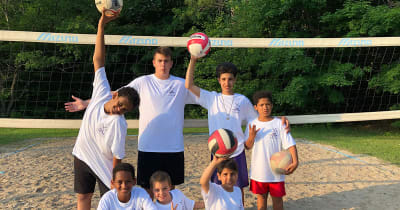Contents
General comments
The camp should provide you with contact information and procedures.
Parents who are accustomed to communicating instantly with their children by cell phone, email or text messaging may have to adjust their expectations, however. Members of the staff prefer to spend time with the campers rather than in the office managing communications from hundreds of parents. The director will be happy to explain the philosophy on which their communication policy is based.
Constant communication with parents is inconsistent with a camper developing his independence. However, be assured that if there is any concern with your child whether emotional, physical or behavioural, the camp will be contacting you. Circumstances that would merit a call could be an overnight stay in the health centre, a visit off site to a hospital or doctor or severe homesickness.
Many camps oblige campers to write at least one personal letter home. In some camps, the counsellors write to the parents to tell them how their child is adjusting. Camps often relay general current information and pictures on their website. Others may mail a newsletter with updates on camp events.
Letters
Many camps prefer that you communicate with your camper by letter. Letters rank high on a camper’s list of priorities so write soon and often. Quantity trumps quality! Some parents post a letter before the camper leaves home to ensure that mail is waiting at camp. Or, if you can, unobserved, slip a letter into your child’s luggage at the last moment. The letter will be a pleasant surprise on arriving at camp. Provide the camp address to friends and relatives who are also willing to write.
Keep your letters positive, newsy, encouraging and supportive. Resist overly enthusiastic descriptions of special outings enjoyed by siblings in the camper’s absence, events they might resent missing. Unhappy news is best delivered in person when your camper returns home. And even when it is true, don’t mention that you, or the family dog, miss your camper!
It is one of a counsellor’s responsibilities to encourage campers to write home; however, it is a good sign if you are not overwhelmed with letters! A happy camper is too busy having fun to write frequent letters. Provide your camper with paper, pen and addressed, stamped envelopes. Letters from camp are often amusing and delightful and become family keepsakes. However, should you receive an unhappy letter, remember that the letter was written several days before and the problem may have since resolved itself. However, if you are concerned, do not hesitate to call the director. Likely you will discover that the camp already knows about the problem and has taken steps to correct it.
Parcels
Receiving a parcel at camp is a special treat. Books, magazines, comics, stickers or markers are welcome items. However, don’t send candy or food as most camps ban food parcels for many good reasons.
- Campers eat three good meals a day. Treats are part of special programs such as popcorn on Circus Day or Freezies on Watersports Day. Most camps have a camp store where campers may purchase the occasional candy bar or bag of chips.
- Food in camper cabins encourages visits from unwelcome creatures: ants, mice, chipmunks or raccoons.
- Social problems arise when some campers receive food parcels and others do not. It took a counsellor the rest of the day to undo the damage done in five minutes by an eight-year-old camper whose parents had left the remains of a case of pop after a visitors’ day picnic. Sitting on the steps of her cabin, surrounded by a crowd of young campers, Susie bestowed the gift of a cold can of pop on a few chosen friends. When the supply ran out, the rest were understandably upset!
- Most camps endeavour to be nut-safe to protect campers with severe allergies. Controlling food supplies is essential. Food arriving at camp is usually confiscated and either disposed of or returned with the camper on departure day.
Faxes and emails
Some camps (by no means all) accept faxes (maybe one page, once a week) or limited e-mails (possibly one a day) from parents (not friends or relatives). These messages are one-way only. Campers do not have access to the camp office computer or fax machine.
Phone calls
Very few camps allow campers to speak with parents by phone for several good reasons:
- Phone service into camps is limited and could not meet the demands of the entire camp population.
- Directors prefer to keep lines open for business purposes or the rare emergency call.
- Philosophically, allowing campers to speak on the phone to their parents is counter-productive to the aims of camp, which are to encourage campers to be self-sufficient and independent.
- If a child is homesick, hearing a parent’s voice usually makes things worse not better.
An exception to the no-phone call rule is sometimes made for international campers to assure parents that their child has arrived safely after traveling a significant distance.
Most camps ban personal cell phones. Phones arriving at camp are confiscated and returned on departure day.
Visiting your child during a session
Camps differ widely in their visitor policies. Some have a wide open policy allowing parents to choose any convenient date. Some schedule specific visitors’ days. If there is only one day per session, a special program is planned for campers whose parents are unable to visit on that day. Some ban parental visits entirely but may encourage the parent and potential camper to visit the site as part of the process in choosing a camp. Most visits take place on the camp site although some camps permit parents to take their child off-site for a limited period of time.
Directors will willingly explain the philosophy supporting their particular policy. If the session is short, a visit cuts into limited program time. Camp schedules are full with trips off site, planned activities and special events. Scheduling parental visits is an added complication. If a child is having difficulty adjusting to camp, a parents’ visit usually makes matters worse. If you have the option to visit, but are unsure how your camper will adjust to camp life, consult the director before deciding. It would be regrettable to reverse the staff’s hard work by arriving shortly after your child has overcome his initial struggle with homesickness. Don’t promise your child that you will visit if there is a possibility that your plans will change. A cancelled visit is a disappointment; an unanticipated visit is a pleasant surprise. It may sound strange, but if permitted, a good day to visit is the last day of your child’s session. Your child can proudly give you the complete tour and introduce their counselor and new friends; then, the family departs happily together. Parents will better appreciate the post camp stories if they have viewed the site.
--With files from Catherine Ross







